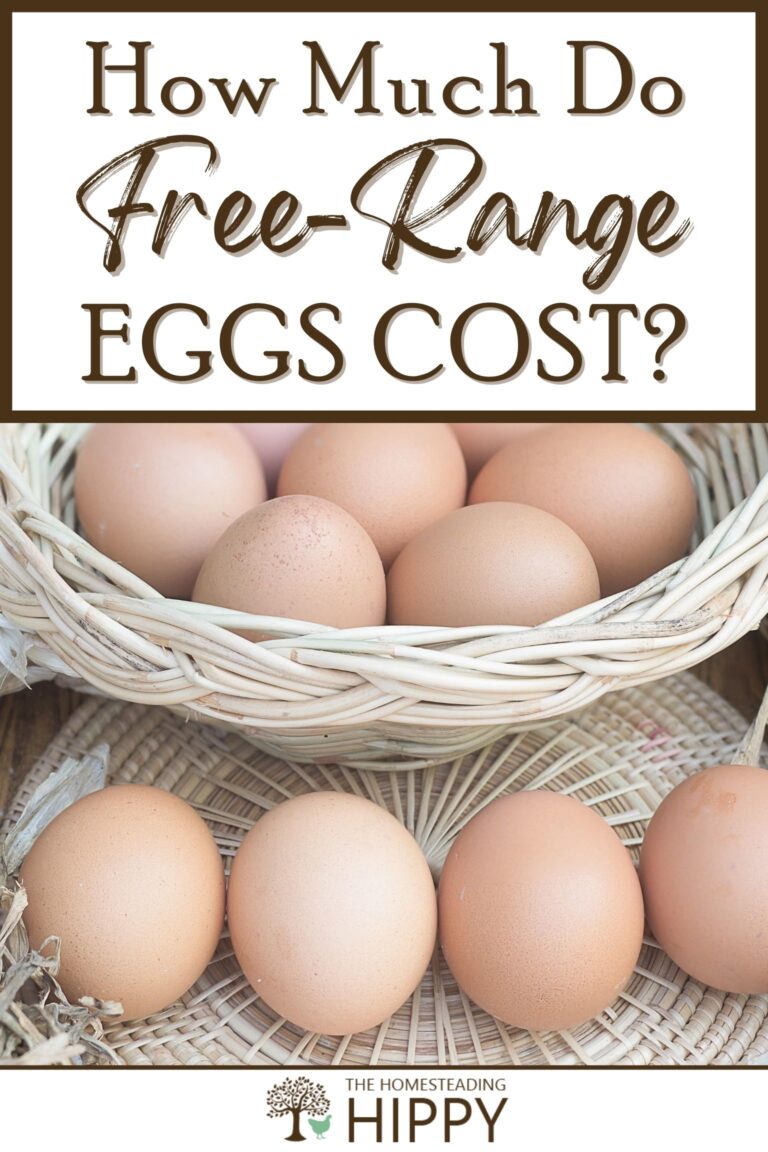With all the concerns surrounding additives in our food and even the ongoing contamination of meat thanks to medications and supplements that animals eat, more and more people are turning to cleaner options for their food

One of the most popular is free-range eggs. But, like all high-quality food, it tends to be more expensive. Just how much do free-range eggs cost?
Free-range eggs typically cost between $4 and $7 a dozen depending on where you live, and on various market factors.
That certainly seems a little spendy for a dozen eggs, but we’ll need to know more if we are going to figure out if the benefits are worth the cost. You might even decide to start raising your own laying flock rather than pay that price year in and year out.
Keep reading and I’ll tell you everything you need to know about the cost of free-range eggs.
Price Varies by State
The best way to find out the average price of a dozen free-range eggs near you is to ask at your local grocery store or farmers market. They will have a good idea of what their customers are willing to pay and can give you an accurate estimate.
Of course, if you live in an area with a lot of small farms and farmers markets, you will likely be able to get a better deal on your eggs than someone who lives in a big city where there is more demand and less supply.
Naturally, some remote states like Alaska and Hawaii will see serious price hikes on many goods, including free-range eggs.
Hawaii will rarely pay less than $5 for any carton of eggs, and just last year rural residents of Alaska were paying up to $22 for the same amount. Yikes!
But if you live in anywhere else, you certainly won’t be facing prices that dramatic, at least not yet.
Factors in Free-Range Egg Price
Supply and demand play a role in pricing, as mentioned, but so does the cost of chicken feed, which can be unpredictable. The price of chicken feed is determined in part by the price of corn.
When corn prices are high, so too is the price of chicken feed, and this will eventually be reflected in the cost of eggs.
The price of eggs is also affected by fuel costs. It costs more to ship eggs long distances than it does to ship them shorter distances.
This is why you might pay more for free-range eggs at the grocery store than someone who buys them from a farmer down the road.
Believe it or not, even the weather can affect the market price of eggs. If bad weather kills off a lot of chickens or makes it difficult to get eggs to market, the price will go up. The same is true in cases of epidemic disease or other “force majeure”.
When all is said and done, the price of free-range eggs varies widely depending on many factors.
It’s important to remember that the price isn’t just about what it costs to raise the chickens and the labor needed to gather the eggs.
It also has to do with shipping, handling, storage, and other factors that impact the final cost to consumers.
Beware Slippery Marketing Terms
There is a point of confusion in egg terminology that often leads to grief when it comes to consumer assessment of egg prices and value.
Free-range doesn’t necessarily mean organic, although the two terms are often used, wrongly, interchangeably. There are other commonly advertised terms that may likewise confuse the uninitiated.
We’ll talk about these terms below.
Cage-Free and Free-Range Aren’t the Same Things
It’s important to understand that “cage-free” and “free-range” are not the same thing, although they are sometimes used interchangeably, which can be confusing.
Cage-free simply means that the chickens were not confined to a cage for life. That’s it.
They may have had access to the outdoors or they may not have. It all depends on the particular farm where they were raised. If the chicken can leave its cage, it is cage-free.
Free-range chickens, on the other hand, are guaranteed to have had access to an outdoor space at some point during their lives.
How much and how often? Unspecified: the amount of time they spend outdoors and the size of the area they are allowed to roam varies.
More than anything else, it is these two terms that consumers mix up, and as you have just learned neither will make a significant difference in the life of the bird laying the eggs.
Pasture-Raised Eggs are Closer to Most Folks’ Ideal for Chickens
There is another term that you won’t see too often, but it represents the ideal that most egg buyers think of when they see the words free-range.
Pasture-raised means that chickens must have at least 108 square feet of pasturage to roam, eat and relax in. It is this classification that mimics their natural lifestyle, or the ideal lifestyle of a backyard flock, the closest.
Pasture-raised chickens are happier, have a much-improved diet, and generally produce higher quality eggs.
Organic Eggs Cost More, Too
Then we have the big factor for many buyers these days: organic. Organic certified eggs must first be free-range to qualify, but then the chickens laying them must also be fed a certified organic diet and never administered hormones or drugs.
This is more expensive, but many feel it’s worth it to know that the chicken was never exposed to antibiotics or other drugs and that their feed was also chemical-free.
The Better a Chicken’s Quality of Life, the More Expensive the Eggs
As a rule of thumb, all of these qualifiers add cost to the price tag of your eggs. There is also overlap between some of them, as pasture-raised and organic are often seen together, but not always.
In short, the better the lifestyle of the chicken, and the fewer drugs, chems and fake food are involved in raising the chicken, the more expensive the eggs will be.
Can You Save Money Raising Your Own Chickens for Eggs?
Naturally, many homesteaders see the climbing cost of high-quality eggs, and think that they should just get a flock of layers and make their own.
Surely it would be cheaper than paying $7 plus for a carton of “boutique” eggs, right?
Maybe, maybe not… To make that determination, you should look at all the costs involved with raising and caring for chickens, not to mention the cost of your time.
Compare the Cost of Raising Your Own Free-Range Eggs
Chickens are fairly low-maintenance animals, but there is still much they require in terms of materials and food.
First of all, you’ll need to purchase a coop or build one yourself. This can range from a simple wooden structure to an elaborate custom-built chicken palace, costing anywhere from a couple of hundred bucks to well over a thousand.
Then, you’ll need to stock up on chicken feed and bedding material. Bags of feed can cost around $15, and you may need to purchase several per month depending on the size of your flock.
Bedding material such as straw or wood chips will also need to be replaced periodically and may have an associated cost.
Then, sadly, there is the replacement cost of chickens themselves. They will invariably fall prey to predators one way or the other no matter how diligent you are, and injuries and sickness will periodically take their toll.
Lastly, don’t forget the occasional vet visit. Chickens are susceptible to a variety of health problems, so it’s important to have a professional on retainer to help keep your flock healthy and happy.
In the end, the costs of raising chickens can vary depending on the size and care needs of your flock.
They are generally fairly affordable animals to keep but in almost all cases, it is cheaper to just buy the eggs unless you eat a ton of them every month.
But, there is something to be said for being able to go out to your backyard, collect eggs from chickens you have known and cared for all their lives, prepare them in any number of ways and sit down to a healthy meal that you produced with your own two hands – with a little help from your birds!

Tom has built and remodeled homes, generated his own electricity, grown his own food and more, all in quest of remaining as independent of society as possible. Now he shares his experiences and hard-earned lessons with readers around the country.
Find out more about the team here.
